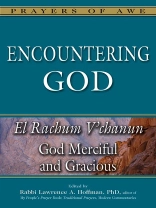It is time to recover rabbinic lessons of late antiquity: God is a God of grace and love; human beings can aspire to goodness and promise; on Yom Kippur the two of them meet—God’s love energizes human potential and the world is reborn with hope restored.
The God of Jewish tradition is far from the strict God of justice commonly understood to be the God of the Hebrew Bible. God’s self-introduction to Moses atop Mount Sinai does indeed conclude with the image of punishment throughout the generations but begins with ‘God merciful and gracious, ‘ the imagery that finds its way into rabbinic liturgy and lore as solely the God of grace and compassion, pardon and love.
To arrive at this selective perception of biblical tradition, the Rabbis of the Talmud deliberately misread the biblical text, and then fashioned a myth of God who dresses up as a leader of prayer and promises pardon if Israel will only repeat these merciful attributes as part of its prayer ritual on that day. Ever since, the Thirteen Attributes—as the list comes to be known—becomes central to Jewish prayer, accompanying the liturgy for holidays generally, and framing the opening and closing services of the holiest day in the Jewish year, Yom Kippur, the “Day of Judgment” itself.
In this seventh volume in the Prayers of Awe Series, contributors—men and women, rabbis and laypeople, scholars and artists from across the spectrum of Jewish life, and representing the US, Israel, the UK, Germany, France, Canada, and Australia—chart the importance of these Thirteen Attributes of God. They explore the kind of God Jews meet in prayer and the consequent self-reflection about the human condition that Judaism recommends on the basis of its idealized image of God as, above all, merciful and gracious.
Circa l’autore
Rabbi Lawrence A. Hoffman, Ph D, has served for more than three decades as professor of liturgy at Hebrew Union College–Jewish Institute of Religion in New York. He is a world-renowned liturgist and holder of the Stephen and Barbara Friedman Chair in Liturgy, Worship and Ritual. His work combines research in Jewish ritual, worship and spirituality with a passion for the spiritual renewal of contemporary Judaism.His many books, written and edited, include seven volumes in the Prayers of Awe series: Who by Fire, Who by Water—Un’taneh Tokef; All These Vows—Kol Nidre; We Have Sinned: Sin and Confession in Judaism—Ashamnu and Al Chet; May God Remember: Memory and Memorializing in Judaism—Yizkor; All the World: Universalism, Particularism and the High Holy Days; Naming God: Avinu Malkeinu—Our Father, Our King; and Encountering God: El Rachum V’chanun—God Merciful and Gracious. Hoffman also edited the ten-volume series My People’s Prayer Book: Traditional Prayers, Modern Commentaries, winner of the National Jewish Book Award; and coedited My People’s Passover Haggadah: Traditional Texts, Modern Commentaries, a finalist for the National Jewish Book Award (all Jewish Lights).Rabbi Hoffman cofounded and developed Synagogue 2/3000, a transdenominational project to envision and implement the ideal synagogue of the spirit for the twenty-first century. In that capacity, he wrote Rethinking Synagogues: A New Vocabulary for Congregational Life (Jewish Lights).







![Copertina di Brian Schrag & Julisa Rowe: Community Arts for God's Purposes [Chinese] 貼近神心意的社群藝術 Copertina di Brian Schrag & Julisa Rowe: Community Arts for God's Purposes [Chinese] 貼近神心意的社群藝術](https://static.worldofdigitals.com/thumb_webp/740/9781645083740.webp)




